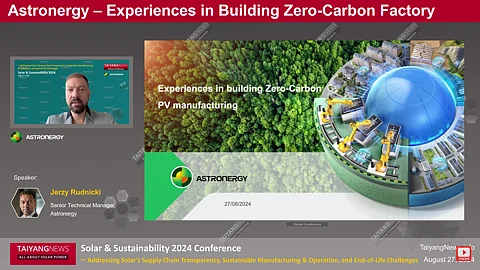

Astronergy has set a 2050 goal to be a carbon-neutral company
In line with its carbon-neutral goal, the company aims to certify up to 8 zero-carbon factories by 2028
Its first zero-carbon factory at its Yangcheng base operates on 4 key pillars - green supply chain, green manufacturing, green product design, and green recycling
In the context of global warming, climate change, geopolitical instability, and other challenges, sustainability has become a central concept in the global economy. Decarbonization is a key focus within the environmental pillar of sustainability, which is built on 3 main pillars: environment, society, and governance. Particularly, to be a carbon-neutral manufacturing company, it needs to significantly reduce all 3 types of greenhouse gas (GHG) emissions – Scope 1 (direct GHG emissions), Scope 2 (indirect GHG Emissions from purchased electricity), and Scope 3 (other indirect GHG emissions).
At the TaiyangNews Solar & Sustainability 2024 Conference, Jerzy Rudnicki, Senior Technical Manager at Astronergy, delivered an insightful presentation on the company's zero-carbon PV manufacturing efforts and how they align with its carbon-neutral goals (see Astronergy presentation here).
Astronergy, a subsidiary of Chint Group, has manufacturing capacity in both PV cells and modules, boasting a production capacity of 65 GW for PV cells and 76 GW for PV modules by the end of 2024. This Chinese company operates 9 domestic and 3 overseas manufacturing facilities – 1 in Thailand and 2 in the deployment phase – and is expected to increase its n-type PV technology production capacity from 91% to over 98% by the end of 2025.
To address key environmental, social, and governance (ESG) issues as part of its sustainability strategy, Astronergy set individual goals for the milestone years of 2028, 2035, and 2050 in August 2023. Major ESG issues include climate change, natural resource management, labor and human rights, occupational health and safety, business ethics, supply chain management, biodiversity conservation, and achieving carbon neutrality by 2050. In line with its ultimate goal of becoming carbon-neutral by 2050, the company has published an ESG report, received certification for a zero-carbon factory, and earned multiple green certificates for its products, says Rudnicki. He adds that the company aims to have up to 8 zero-carbon factories by 2028.
Rudnicki elaborated that zero-carbon manufacturing is built on 4 fundamental pillars: green supply chain, green manufacturing, green design, and green recycling.
Starting with a green supply chain, Astronergy has implemented several eco-friendly processes, including green supplier management and evaluation, green supplier training, and selection, to enhance social responsibility across its value chain and promote sustainable business practices. The company’s products are fully traceable across the entire value chain. Additionally, Astronergy introduced new documents and updated older versions based on the 2022 Supplier Management and Social Responsibility systems, noted Rudnicki. In 2023, new supply chain management documents were introduced, including processes for supplier entry, supplier exit, and supplier performance management, to improve oversight. As part of its ongoing sustainability improvements, Astronergy launched an excellent green supplier contest in June 2023, which saw 65 participants. After a comprehensive assessment, it recognized 6 suppliers for their exceptional green efforts. Future plans include supporting suppliers in certifications, ESG audits, controversial procurement, raw material traceability, and capacity-building training, says Rudnicki.
Regarding green manufacturing, Astronergy received its first zero-carbon factory certification for the Yancheng base. The factory achieved this by installing rooftop PV power stations and 200 PV street lights, building PV carports, and incorporating automatic lighting systems to reduce carbon emissions. Additionally, the company adopted water-saving appliances, eliminated high-energy-consuming equipment, and selected green building materials and low-energy structures. It also established energy and carbon management systems to monitor and analyze energy consumption dynamically, according to Rudnicki. The Yancheng factory, certified by TÜV Rheinland – Type 1 ***, has achieved up to 69% renewable energy utilization and offset more than 65% of its GHG emissions, equivalent to 64.5kTCO2e in carbon emissions.
Following the green supply chain and manufacturing, Rudnicki discussed the company’s green product designs. Technological advancements for the ASTRO N7 series modules include the incorporation of low-temperature zero busbars (0BB) metallization and tiling film technology, as well as reducing raw material consumption – such as metallization silver paste – by up to 20% and thinning the silicon wafer to up to 100 µm. More importantly, Astronergy’s compliance with PFAS-free product development led to a migration from a fluorine-contained backsheet to a double-glass design. These green products have been certified with up to 15 low-carbon product certifications across 22 product models.
The fourth green pillar, green recycling, plays a vital role in promoting a circular economy, according to Astronergy. Rudnicki explained that the company uses recyclable packaging materials, such as cartons, pallets, and packaging belts, at a 100% rate, while the recycling rate of PV cells is 95%. Additionally, Astronergy has a green recycling commitment in place through an agreement with PVCYCLE.
